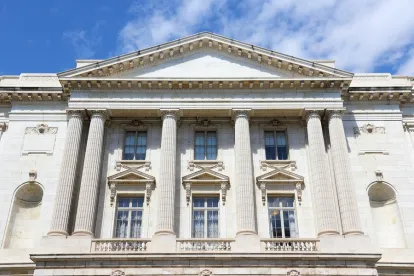A high-stakes summer is underway in America, where President Donald Trump and the nation’s governors are pushing forward with plans for reopening the nation’s economy even as many nervously eye health indicators that suggest the coronavirus may not be satisfactorily contained. In a vivid illustration of this tension, the Republican National Committee announced Thursday that Trump will accept the GOP’s 2020 presidential nomination in Jacksonville, FL, moving his glitziest convention events from North Carolina to a state with more permissive policies on social gatherings – and a steadily-rising number of confirmed COVID-19 infections.
Topics covered today include: tax and economic development, health, government oversight and state level developments.
POLITICO notes this morning:
In Florida, cases are soaring again. . .[the] state reported a record daily number on Thursday, in what state officials attributed to outbreaks within farming communities and a rise in testing capacity.”
Florida has now averaged more than 1,000 positive test results a day since May 28 — which was two weeks after Gov. Ron DeSantis began allowing certain restaurants and stores to reopen.”
While states and territories move cautiously into summer, the leader of the US Senate’s top education policy committee is thinking ahead to the next federal COVID-19 response package and what needs to be included to ensure schools across America can reopen this fall. Senate Committee on Health, Education, Labor and Pensions (HELP) Chairman Lamar Alexander (R-TN) took to the Senate floor Thursday to summarize what his panel has learned from hearings in recent weeks and what it means for the next pandemic-related measure, saying Congress should be prepared to provide both additional money and protections against lawsuits for learning institutions as they seek to bring students back this autumn:
I think it’s in our interest to make sure that principals and school boards know that they’ll have sufficient funds to open 100,000 public schools safely, because school administrators, with all respect, sometimes are a little bit conservative, reluctant to take risks, and if there’s the excuse that we don’t have enough money to open safely, they may just say let’s keep up with remote learning. I think we’re about up to here with remote learning in most places in the country. It’s especially not good for younger children and for children who are from disadvantaged families or low-income families. So I think it’s important to get the country going and it’s good for the children and it’s good for the parents to make sure that schools have sufficient funds to reopen safely.
The one other thing I would mention is I heard about liability yesterday. The colleges and the schools I’ve talked to want to be included in whatever the federal government does to make sure that teachers and administrators and schools and universities are appropriately protected from lawsuits as a result of the COVID-19 epidemic. As long as they meet a standard of care that is reasonable, they should not have to worry about being liable if a child whose eight years old forgets to wear a mask, coughs on another child, that child goes home and makes grandma sick and grandma sues the school. Teachers are always worried about liability.”
Also eyeing the fall, but from a much different perspective, is the Trump White House, which is said to be preparing an executive order suspending the issuance of H-1B and other employment-related immigration visas into the United States into October. The potential move, which comes as President Trump’s poll numbers are sagging by comparison to Democratic-nominee-to-be Joe Biden, could hamper economic recovery efforts, the US Chamber of Commerce warns, and would run counter to the data contained in the recent employment reports that have been hailed by the president and his advisors, notes an analysis in Forbes:
The Trump administration hopes to use the economic fallout from the coronavirus pandemic to impose new immigration restrictions on H-1B visa holders and international students, but reality is undermining its case. The unemployment rate for individuals in computer occupations declined from 3% in January 2020 (before the pandemic spread in the U.S.) to 2.8% in April 2020, and fell again to 2.5% in May 2020, according to an analysis of the Bureau of Labor Statistics’ Current Population Survey by the National Foundation for American Policy (NFAP). The unemployment rate in computer occupations has been stable and, in fact, falling.”
Tax and Economic Development Updates
Yesterday, Treasury Secretary Steven Mnuchin made clear that “[w]e can’t shut down the economy again…We’ve learned that if you shut down the economy, you’re going to create more damage.” Nevertheless, he continues to message that the Trump Administration is supportive of another COVID-19 relief package and is now suggesting that the Treasury Department is considering whether to reassess the definition of “national security” firms, as there remains approximately US$17 billion in unused CARES Act funding given that Boeing and GE are no longer expected to seek such financial assistance. The Treasury Secretary is also now suggesting that the administration may be supportive of funding to help state and local governments address their financial needs stemming from the ongoing public health crisis, though the size and scope of such aid is still up for debate. Recall that House Democrats’ HEROES Act, which passed the House last month, would provide nearly US$1 trillion to state and local governments; the SMART Act, which is the Senate’s counter proposal, would provide US$500 billion in relief – though it appears to have bipartisan, bicameral support, making it a leading contender for any next legislative response.
Notably, while the Paycheck Protection Program (PPP) is currently set to stop offering loans on June 30, Secretary Mnuchin yesterday expressed an interest in potentially extending the program – though he underscored the that any such extension must be accompanied by “very specific criteria [to ensure loans are] really going to companies that really need it.” At the same time, there remain concerns about some of the recent changes made to the PPP, including the lowered threshold (60% down from 75%) of loan proceeds that must be spent on payroll expenses in order to qualify for loan forgiveness. In fact, according to Roy Houseman, legislative director of United Steelworkers, “[t]his change represents a huge loophole in legislation that was meant to help workers keep their paychecks coming during the economic fallout from the pandemic.” That said, Secretary Mnuchin is also exploring additional incentives outside of the PPP to get people back to work and has suggested that “[a]nother way of doing it in a very efficient way are refundable tax credits.”
With regard to taxes, we have learned that the House Committee on Ways and Means Select Revenue Subcommittee is set to hold a hearing next week to discuss potential policy ideas to include in future relief legislation and, according to Politico, “is likely to raise refundable tax credits and other ‘safety net’-type tools in the tax code… [though d]on’t expect many surprises.” Separately, note that yesterday, the Internal Revenue Service issued Notice 2020-46, which addresses the federal income and employment tax treatment of cash payments made by employers under leave-based donation programs to aid victims of the ongoing COVID19 pandemic in the affected geographic areas. Specifically, the guidance provides cash payments an employer makes to certain charitable organizations in exchange for vacation, sick, or personal leave that its employees elect to forgo will not be treated as income to the employees if the payments are: (1) made to the section 170(c) organizations for the relief of victims of the COVID-19 pandemic in the affected geographic areas; and (2) paid to the section 170(c) organizations before January 1, 2021.
Health Updates
On Thursday, Senate Committee on Finance Chairman Charles Grassley (R-IA) and Ranking Member Ron Wyden (D-OR) wrote to Department of Health and Human Services (HHS) Secretary Alex Azar, requesting more transparency of the funds distributed to healthcare providers during the pandemic. Highlighting the Provider Relief Fund and the Medicare Accelerated and Advance Payment Programs, the lawmakers explained that the recipient information released by HHS to the public thus far has been inadequate and fragmented. The senators note, “The magnitude of these distributions alone – in the form of grants and advance payment loans – necessitates the utmost transparency to inform providers, the public, and Congress. Accordingly, we urge you to expeditiously establish a single, comprehensive and publicly available data source that easily shows the amount of funding received by each provider.” Chairman Grassley and Ranking Member Wyden also requested additional details of the Fund’s general distribution Terms and Conditions provision requiring recipients of more than US$150,000 to submit reports on the receipt and use of funds. The senators’ requests come as HHS has faced increased scrutiny over how it has distributed funds to providers, with articles in Bloomberg, the New York Times and the Wall Street Journal all reviewing the HHS grant and loan programs, and bicameral, bipartisan lawmakers questioning the speed and specific allocations of funding disbursements.
Senate Minority Leader Chuck Schumer (D-NY) has requested a briefing from the White House Coronavirus Task Force for Senate Democrats on the status of the pandemic. In remarks on the Senate floor, Senator Schumer criticized the administration and Senate Republicans for their current coronavirus response, stating, “As the President continues to fixate on the stock market and Senate Republicans are ready to prematurely declare victory, we need to wrest the focus back to these crucial issues. So today I’m requesting that Dr. Fauci and Dr. Birx and other members of the administration’s Coronavirus Task Force conduct a briefing for Democratic Senators on the recent spikes [of COVID-19 cases]—do it next week. We need to understand why these spikes are happening and how to adapt our national response.” On the other side of the Capitol, House Democrats have begun to detail their upcoming floor schedule, which includes healthcare legislation. Yesterday, House Majority Leader Steny Hoyer (D-MD) stated that the House will consider legislation focused on Affordable Care Act stabilization during the week of June 29. Bloomberg expects the legislation to be similar to H.R. 1884, the Protecting Pre-Existing Conditions and Making Health Care More Affordable Act of 2019 – which it notes was “a bill [that] was largely ignored by Senate Republican leadership, who didn’t take it up.”
House Committee on Ways and Means Chairman Richard Neal (D-MA) and House Committee on Energy and Commerce Chairman Frank Pallone, Jr. (D-NJ) acknowledged recently released Centers for Medicare and Medicaid Services (CMS) guidance regarding nursing home seizures of residents’ economic impact payments (EIPs). The chairmen commended the guidance, explaining, “We’re relieved CMS heeded our concerns and issued clear guidance prohibiting this unlawful practice.” As we previously reported, Chairman Pallone and Chairman Neal recently wrote to CMS Administrator Seema Verma, addressing reports that some nursing homes and senior living facilities are requiring Medicaid residents to sign over the EIPs they receive. The lawmakers clarified, “EIPs are advanced tax credits and cannot be counted as ‘income’ or ‘resources’ for the purpose of federal benefit programs, such as Medicaid. By law, the only reason an EIP may be offset is for past-due child support owed by a state agency or custodial parent.” The letter referenced a May alert released by the Federal Trade Commission on this issue. The new CMS guidance is available here.
Oversight Updates
Yesterday, House Majority Whip James Clyburn (D-SC), Chairman of the House Committee on Oversight and Reform’s Select Subcommittee on the Coronavirus Crisis, announced the subcommittee’s staff, which consists of 19 members. They include former federal prosecutors, congressional investigators, private practice lawyers and legislative staffers.
Also yesterday, the subcommittee held a video briefing with experts and affected Americans to examine the impact of the pandemic on nursing home residents and workers. Approximately 40,000 nursing home residents and more than 600 employees have died from COVID-19. A combination of factors has contributed to this high death toll, including shortages of testing supplies and personal protective equipment, under-staffing, poor infection control and limited federal guidance and resources.
As noted above, Senate Finance Committee Chairman Grassley and Ranking Member Wyden wrote a letter to HHS Secretary Azar, requesting that the agency release data on which health care providers received relief as part of the approximately US$210 billion allocated by Congress, and to do so expeditiously and “in a useable format.” The senators acknowledged that HHS has provided information on the distribution of some relief, including that from the Provider Relief Fund, but noted “significant limitations” in that data, which inhibits “meaningful analysis.”
CNN reports, as part of the administration’s Air Bridge Project, that nursing homes are getting “gowns that look more like large tarps—with no holes for hands—and surgical masks that are paper-thin.” The project is facing scrutiny, as lawmakers have called for investigations by the inspectors general (IG) comprising the newly-created Pandemic Response Accountability Committee and the Department of Justice. Nursing homes themselves are facing scrutiny by the HHS (IG).
Treasury Secretary Steven Mnuchin has said that the administration does not plan to release the names of borrowers or the amounts received under the PPP because this information is “proprietary” and “confidential.” Treasury has taken this position even though PPP loan applications state that this information will be released “automatically,” and the Small Business Administration website calls it public records. Bharat Ramamurti, one of the four members of the Congressional Oversight Commission, called Treasury’s announcement “outrageous,” adding that, “if the Administration won’t release this information, Congress should require them to do so.” The Washington Post reports that, even the Government Accountability Office, which is required to submit a report on PPP spending by the end of June, has not received the data and has not been advised when it may be forthcoming, nor have members of Congress.
Yesterday, Ramamurti participated in a virtual briefing with Representative Katie Porter (D-CA) and other members of Congressional Progressive Caucus. In his opening remarks, Ramamurti echoed the concerns the Commission expressed in its first report to Congress on May 18. Namely, he emphasized that “the Treasury and the Fed have used hardly any of the $500 billion Congress provided.” Ramamurti also reiterated the points he had been making in his tweets, including that the existing programs “have been very helpful to big corporations,” but not “to mid-size companies and to state and local governments that need actual financial support from the Fed.” Ramamurti also criticized the Federal Reserve for not requiring program beneficiaries to maintain payroll or rehire workers.
Bloomberg reports the Department of Justice and the Securities and Exchange Commission (SEC) brought allegations of securities fraud and conspiracy to commit the same, stemming from a COVID-19-related stock scheme. A criminal complaint was unsealed yesterday, charging a Canadian citizen for his alleged involvement in “false and misleading stock promotional activities” regarding a company’s ability to produce face masks of medical quality for use during the pandemic. In a separate action, involving four additional individuals and related companies, the SEC has obtained a temporary restraining order and asset freeze to halt the alleged scheme.
State Updates
Yesterday, Maryland Attorney General Brian Frosh (D) announced his office was partnering with the Maryland Access to Justice Commission to form what he called the COVID-19 Access to Justice Task Force. The Task Force is an effort to identify civil justice reform measures needed in the wake of the COVID-19 crisis. The Task Force anticipates dealing with issues of increased medical and consumer debt, public benefit denials, unemployment, homelessness and how to improve availability of free or affordable legal help. Attorney General Frosh expects a “tsunami” of foreclosures and evictions, for example, which have been temporarily halted while emergency orders have been in place.
Hawaii Governor David Ige (D) earlier this week announced he would be extending the state’s mandatory 14-day quarantine for those traveling to Hawaii from international or out-of-state locations through the end of July. The emergency proclamation, however, does lift the quarantine requirement for inter-island travelers on June 16 when the Hawaii National Guard will start checking passengers’ temperatures arriving through Daniel K. Inouye International Airport. Passengers are also required to fill out a mandatory form and answer health questions. If they have a temperature above 100.4, they will not be able to board the plane. This is the governor’s ninth supplementary proclamation related to the COVID-19 emergency.
Idaho Governor Brad Little (R) announced yesterday that the state will enter Stage 4 of the Idaho Rebounds plan allowing the state to fully reopen on Saturday. With record-high unemployment numbers due to the pandemic, some Idaho residents still have not received their unemployment checks after being laid off. Last week, the governor announced that the state will offer US$1,500 bonuses to unemployed Idahoans who return to work instead of staying on unemployment, where many get paid more than their jobs pay. The bonuses were financed with up to US$100 million in federal relief money.
Brandon Roman and Mara Sheldon also contributed to this article.







 />i
/>i

